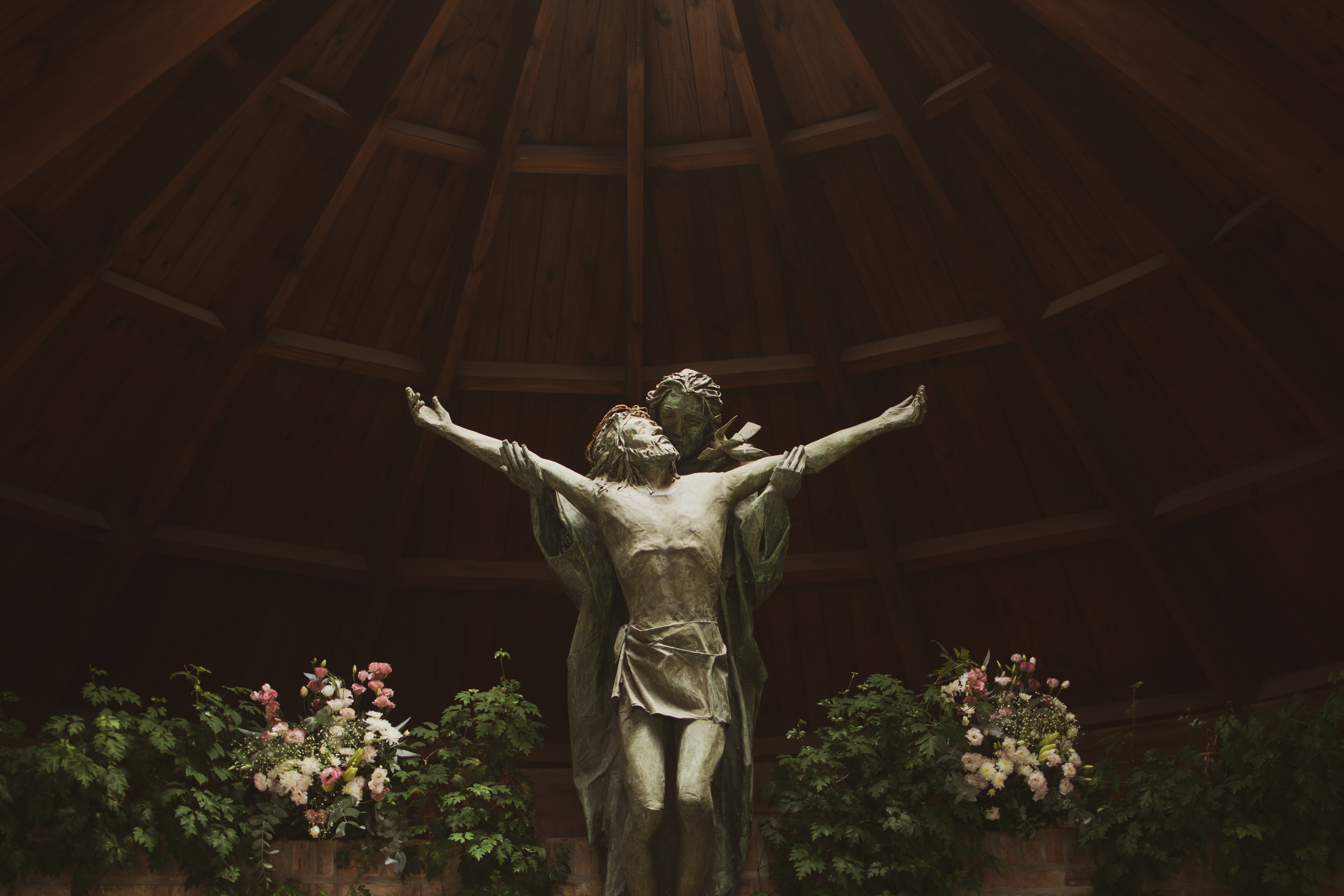If your parents happened to name you after a biblical character or a saint, as mine did, then you probably have at least done a little research into your namesake. For instance, I know that St. Michael the Archangel is mentioned by name five times in the Bible, three in the Book of Daniel, once in the Epistle of St. Jude, and of course, his big scene in Revelation, casting out the devil and his fallen angels from heaven. And, thanks to Pope Leo XIII, we have a prayer to St. Michael that I can pray every morning.
The rest of our first reading for today mentions names we have heard numerous times. Titus and Mark have their own entries in the Bible, and they are also mentioned repeatedly in Paul’s writings; Demas is in and out of favor; and Tychicus is constantly being sent by Paul to firm up the faith of Christians in various locations. All of these names of these real people are important parts of the early Church, spreading the good news of Jesus Christ to the known world and gaining more followers, just as we are commanded to do.
And then there’s Luke. The author of the third Gospel and the Acts of the Apostles, Luke is mentioned by name just three times: in Colossians and Philemon, he is called a coworker by Paul, and in our reading today from 2 Timothy, we learn only that Luke has stayed by Paul’s side in this time of trouble. Those writings and that proximity to Paul tell us of Luke’s importance in spreading the faith, and it’s important to remember Paul mentions him in 2 Timothy, written not long before his martyrdom. Paul is working with his companions to spread the faith even up to the end of his life.
That ties in nicely with what Luke tells us in our Gospel passage today, when Jesus sent out 72 disciples to preach and cure the sick. They are told they won’t be enough: pray for more vocations. They are told they will face hardship, but to bring peace to wherever they go. But basically they are told to go, bring the message of our Lord out to the world. On this feast of St. Luke, let us go and do the same in our little parts of the world.
Si tus padres te pusieron el nombre de un personaje bíblico o un santo, como lo hicieron los míos, entonces probablemente hayas investigado un poco sobre ese santo. Por ejemplo, yo sé que el nombre de San Miguel Arcángel se menciona cinco veces en la Biblia, tres en el Libro de Daniel, una vez en la Epístola de San Judas y, por supuesto, su gran escena en Apocalipsis, expulsando al diablo y los ángeles caídos del cielo. Y, gracias al Papa León XIII, tenemos una oración a San Miguel que puedo rezar todas las mañanas.
El resto de la primera lectura de hoy menciona nombres que hemos escuchado muchas veces. Tito y Marcos tienen sus propios libros en la Biblia y también se mencionan repetidamente en los escritos de Pablo. Demás está dentro y fuera de favor. Y Pablo envía constantemente a Tíquico para reafirmar la fe de los cristianos en varios lugares. Todos los nombres de estas personas verdaderas son partes importantes de la Iglesia primitiva, que difunden la buena nueva de Jesucristo al mundo conocido y ganan más seguidores, tal como se nos manda a nosotros a hacer.
Y luego viene Lucas. El autor del tercer Evangelio y los Hechos de los Apóstoles, Lucas es mencionado por su nombre solo tres veces: en los libros de Colosenses y Filemón, Pablo lo llama colaborador, y en la lectura de hoy de 2 Timoteo, aprendemos solo que Lucas permaneció al lado de Pablo en su tiempo de angustia. Esos escritos y esa proximidad a Pablo nos hablan de la importancia de Lucas en la difusión de la fe, y es importante recordar que Pablo lo menciona en 2 Timoteo, escrito poco antes de su martirio. Pablo está trabajando con sus compañeros para difundir la fe hasta el final de su vida.
Eso se relaciona muy bien con lo que Lucas dice en el pasaje del Evangelio de hoy, cuando Jesús envió a los 72 discípulos a predicar y curar a los enfermos. Se les dice que no serán suficientes: oren por más vocaciones. Se les dice que enfrentarán dificultades, pero que traigan paz a donde sea que vayan. Pero básicamente se les dice que vayan, lleven el mensaje de nuestro Señor al mundo. En la fiesta de San Lucas que celebramos hoy, vayamos y hagamos lo mismo en nuestras pequeñas partes del mundo.
 Mike Karpus is a regular guy. He grew up in Michigan’s Upper Peninsula, graduated from Michigan State University and works as an editor. He is married to a Catholic school principal, raised two daughters who became Catholic school teachers at points in their careers, and now relishes his two grandchildren, including the older one who is fascinated with learning about his faith. He also has served on a Catholic school board, a pastoral council and a parish stewardship committee. He currently is a lector at Mass, a Knight of Columbus, Adult Faith Formation Committee member and a board member of the local Habitat for Humanity organization. But mostly he’s a regular guy.
Mike Karpus is a regular guy. He grew up in Michigan’s Upper Peninsula, graduated from Michigan State University and works as an editor. He is married to a Catholic school principal, raised two daughters who became Catholic school teachers at points in their careers, and now relishes his two grandchildren, including the older one who is fascinated with learning about his faith. He also has served on a Catholic school board, a pastoral council and a parish stewardship committee. He currently is a lector at Mass, a Knight of Columbus, Adult Faith Formation Committee member and a board member of the local Habitat for Humanity organization. But mostly he’s a regular guy.
Feature Image Credit: James Coleman, unsplash.com/photos/akC_b2x–Lc


 David Dashiell is a freelance author and editor in Nashville, Tennessee. He has a master’s degree in theology from Franciscan University, and is the editor of the anthology
David Dashiell is a freelance author and editor in Nashville, Tennessee. He has a master’s degree in theology from Franciscan University, and is the editor of the anthology 
 Kathryn Mulderink, MA, is married to Robert, Station Manager for Holy Family Radio. Together they have seven children (including Father Rob), and seven grandchildren. She is President of the local community of Secular Discalced Carmelites and has published five books and many articles. Over the last 30 years, she has worked as a teacher, headmistress, catechist, Pastoral Associate, and DRE, and as a writer and voice talent for Catholic Radio. Currently, she serves the Church by writing and speaking, and by collaborating with various parishes and to lead others to encounter Christ and engage their faith. Her website is
Kathryn Mulderink, MA, is married to Robert, Station Manager for Holy Family Radio. Together they have seven children (including Father Rob), and seven grandchildren. She is President of the local community of Secular Discalced Carmelites and has published five books and many articles. Over the last 30 years, she has worked as a teacher, headmistress, catechist, Pastoral Associate, and DRE, and as a writer and voice talent for Catholic Radio. Currently, she serves the Church by writing and speaking, and by collaborating with various parishes and to lead others to encounter Christ and engage their faith. Her website is 
 Allison Gingras (
Allison Gingras ( 
 Susan Ciancio has a BA in psychology and a BA in sociology from the University of Notre Dame, with an MA in liberal studies from Indiana University. For the past 19 years, she has worked as a professional editor and writer, editing both fiction and nonfiction books, magazine articles, blogs, educational lessons, professional materials and website content. Thirteen of those years have been in the pro-life sector. Currently Susan freelances and writes weekly for HLI, edits for American Life League, and is the executive editor of Celebrate Life Magazine. She also serves as executive editor for the Culture of Life Studies Program—an educational nonprofit program for K-12 students. You can reach her at
Susan Ciancio has a BA in psychology and a BA in sociology from the University of Notre Dame, with an MA in liberal studies from Indiana University. For the past 19 years, she has worked as a professional editor and writer, editing both fiction and nonfiction books, magazine articles, blogs, educational lessons, professional materials and website content. Thirteen of those years have been in the pro-life sector. Currently Susan freelances and writes weekly for HLI, edits for American Life League, and is the executive editor of Celebrate Life Magazine. She also serves as executive editor for the Culture of Life Studies Program—an educational nonprofit program for K-12 students. You can reach her at 
 J.M. Pallas has had a lifelong love of Scriptures. When she is not busy with her vocation as a wife and mother to her “1 Samuel 1” son, or her vocation as a public health educator, you may find her at her parish women’s bible study, affectionately known as “The Bible Chicks.”
J.M. Pallas has had a lifelong love of Scriptures. When she is not busy with her vocation as a wife and mother to her “1 Samuel 1” son, or her vocation as a public health educator, you may find her at her parish women’s bible study, affectionately known as “The Bible Chicks.”
 Merridith Frediani loves words and is delighted by good sentences. She also loves Lake Michigan, dahlias, the first sip of hot coffee in the morning, millennials, and playing Sheepshead with her husband and three kids. She writes for Catholic Mom, Diocesan.com, and her local Catholic Herald. Her first book Draw Close to Jesus: A Woman’s Guide to Adoration is available at Our Sunday Visitor and Amazon. You can learn more at
Merridith Frediani loves words and is delighted by good sentences. She also loves Lake Michigan, dahlias, the first sip of hot coffee in the morning, millennials, and playing Sheepshead with her husband and three kids. She writes for Catholic Mom, Diocesan.com, and her local Catholic Herald. Her first book Draw Close to Jesus: A Woman’s Guide to Adoration is available at Our Sunday Visitor and Amazon. You can learn more at 


 Sr. Mary Martha Moss, FSP has had the grace of serving the Lord for over 40 years as a Daughter of St. Paul. Joyfully engaged in the community’s media ministry, she has authored 3 children’s books, presented on various topics for adult faith formation, enjoyed running Online Book Studies, served as a Pauline Book & Media Center manager and continues singing the alto part with the Daughters of St. Paul Concert Choir.
Sr. Mary Martha Moss, FSP has had the grace of serving the Lord for over 40 years as a Daughter of St. Paul. Joyfully engaged in the community’s media ministry, she has authored 3 children’s books, presented on various topics for adult faith formation, enjoyed running Online Book Studies, served as a Pauline Book & Media Center manager and continues singing the alto part with the Daughters of St. Paul Concert Choir.
 Kate Taliaferro is an Air Force wife and mother. She is blessed to be able to homeschool, bake bread and fold endless piles of laundry. When not planning a school day, writing a blog post or cooking pasta, Kate can be found curled up with a book or working with some kind of fiber craft. Kate blogs at
Kate Taliaferro is an Air Force wife and mother. She is blessed to be able to homeschool, bake bread and fold endless piles of laundry. When not planning a school day, writing a blog post or cooking pasta, Kate can be found curled up with a book or working with some kind of fiber craft. Kate blogs at 